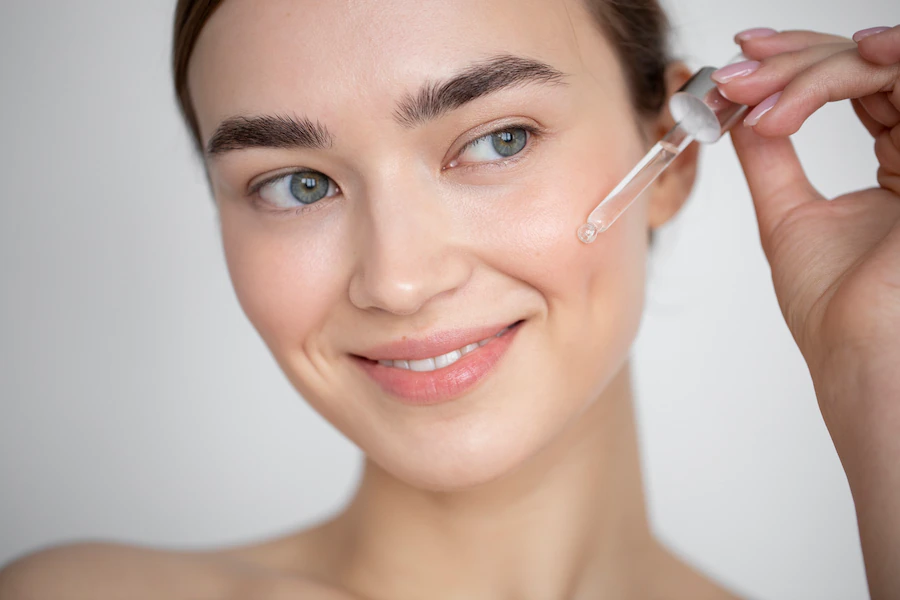Our bodies naturally produce a substance called hyaluronic acid. It is a high molecular glycosaminoglycan-like polysaccharide composed of disaccharide units of N-acetyl glucosamine and glucuronic acid in a linear chain. The skin, or dermis, is where half is concentrated. In fact, one of the most important components of the structure of skin tissues is hyaluronic acid. The skin can remain toned, elastic, and compact due to its fibrous shape.
As already said, our body creates it on its own. However, after the age of 35, when the first mimic wrinkles begin to appear, the amount produced decreases.
What are the functions of hyaluronic acid?
Polymers are long, complicated chain-like molecules such as hyaluronic acid. There are many places in the chain where other chemical compounds, such as water, can join. Hyaluronic acid is the best natural or synthetic polymer for absorbing water, holding approximately one and a half gallons in a quarter teaspoon, making it a key ingredient in moisturizing products.
Hyaluronic acid is excellent for transporting other molecules in the body because it has a large space to trap other molecules. Additionally, because it can bind to cells, targeted delivery of hyaluronic acid-based drugs is a hotly debated area of research.
Due to its chain structure, hyaluronic acid can also act as a scaffold that facilitates tissue growth. This is an important step in how your body heals from wounds. In addition, hyaluronic acid has been found in human embryos and its functions in reproduction and development are being investigated by researchers.
Is hyaluronic acid effective?
Yes, based on your application. It is a molecule that can be used in a variety of ways, and researchers are always coming up with new and useful applications for it. Currently, it is mainly used for eye, joint, and, skin health. , is the subject of hundreds of international scientific experiments and studies.
What effects does hyaluronic acid have on the skin?
A hyaluronic acid serum applied to the skin or taken orally as a supplement can improve overall skin health over time. In addition, it makes your skin more supple and flexible, which contributes to the overall increase in skin elasticity and suppleness.
Does Hyaluronic Acid Help Acne?
Fillers that repair or cover acne scars often contain hyaluronic acid as an ingredient. Hyaluronic acid and other medications in combination with acne treatments have been the subject of limited research, but there is insufficient evidence to suggest that these combinations work.
How safe is hyaluronic acid?
Yes, based on its application. Over-the-counter hyaluronic corrosive serums and items applied to the skin (creams, moisturizers, etc.) or in eye products are considered safe. Although oral hyaluronic acid supplements should still be discussed with your doctor, as with any medication, vitamin, or supplement, they are also considered safe.
Hyaluronic acid supplements prescribed by a doctor should be taken exactly as directed. Hyaluronic acid injections of any kind should only be administered by a licensed and competent physician.
Where else is hyaluronic acid found? Hyaluronic acid is found in the skin and many other parts of the human body:
– Humoral vitreous (eyes)
– Tissue.
– Fluid from the shin.
The walls of the aorta
Tendons
– Uterine cord.
Properties and applications of hyaluronic acid the chemical structure of the molecule gives it properties that make it particularly useful in the medical and aesthetic fields. These properties include increasing tissue plasticity, improving joint functionality, and maintaining skin hydration and even skin tone.
It is used in a variety of applications, including the following:
When severe osteoarthritis affects the joints, intra-articular injections of hyaluronic acid – known as Visco supplementation – are given to restore the elasticity and viscosity of the synovial fluid.
Instead, it is used as an injectable filler in aesthetic medicine to correct minor skin imperfections.
Hyaluronic acid is used to repair perforated eardrums in otological surgery. Artificial tears intended to hydrate the eye contain hyaluronic acid.
Small skin abrasions and wounds can be treated with ointments and creams based on hyaluronic acid sold in pharmacies (connective tissue). Last but not least, there are also dietary supplements based on hyaluronic acid on the market.
There are many products made with hyaluronic acid in the Farmamy store in Italy. Some examples:
- 60 tablets of Giorgini hyaluronic acid skin supplement.
- 10 milliliters of Renova Oxi hyaluronic acid eye drops
- 3 Rudravisc 40 syringes containing 2 ml of hyaluronic acid.
- 50 ml Amada night face cream
What are the functions of hyaluronic acid?
Polymers are long, complicated chain-like molecules such as hyaluronic acid. There are many places in the chain where other chemical compounds, such as water, can join. Hyaluronic acid is the best natural or synthetic polymer for absorbing water, holding approximately one and a half gallons in a quarter teaspoon, making it a key ingredient in moisturizing products.
Hyaluronic acid is excellent for transporting other molecules in the body because it has a large space to trap other molecules. Additionally, because it can bind to cells, targeted delivery of hyaluronic acid-based drugs is a hotly debated area of research.
Due to its chain structure, hyaluronic acid can also act as a scaffold that facilitates tissue growth. This is an important step in how your body heals from wounds. In addition, hyaluronic acid has been found in human embryos and its functions in reproduction and development are being investigated by researchers.
Is hyaluronic acid effective?
Yes, based on your application. It is a molecule that can be used in a variety of ways, and researchers are always coming up with new and useful applications for it. Currently, it is mainly used for eye, joint, and, skin health. , is the subject of hundreds of international scientific experiments and studies.
What effects does hyaluronic acid have on the skin?
A hyaluronic acid serum applied to the skin or taken orally as a supplement can improve overall skin health over time. In addition, it makes your skin more supple and flexible, which contributes to the overall increase in skin elasticity and suppleness.
Does Hyaluronic Acid Help Acne?
Fillers that repair or cover acne scars often contain hyaluronic acid as an ingredient. Hyaluronic acid and other medications in combination with acne treatments have been the subject of limited research, but there is insufficient evidence to suggest that these combinations work.
How safe is hyaluronic acid?
Yes, based on its application. Over-the-counter hyaluronic corrosive serums and items applied to the skin (creams, moisturizers, etc.) or in eye products are considered



